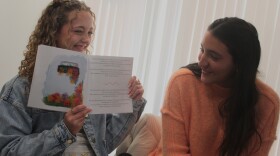This weekend, the Concord Chorale kicks off its fiftieth season with the music of Mozart. They'll be performing along with the Philips Exeter Concert Choir and Chamber orchestra as well as professional soloists from New Hampshire and the Boston area.
NHPR's Peter Biello dropped by a rehearsal and has this report.
You can hear the Concord Chorale kick off its 50th season Saturday evening at 7 at Phillips Exeter Academy and Sunday afternoon at 3 at the Capitol Center for the Arts in Concord. Ticket information at concordchorale.org.
(This transcript has been lightly edited for clarity.)
Recently at South Congregational Church in Concord, members of the Concord crowd gathered to sing music by Mozart specifically his Grand Mass and C minor. Music director Kris Johnson stood in front of them waving his baton as they sat in the pews. He stops them occasionally to offer notes.
"The sweetness and love and also some terror in this opening C minor," says Johnson. "And then when the soprano comes in with day it is like being washed clean. But you will not allow her to have that moment if you don't sing with some real sort of chutzpah. Here we try again. Try and scare the pants off me at the beginning."
Johnson says this Grand Mass was written by Mozart soon after he married his wife.
"He promised her that he would write this piece after the birth of their first child and she was a soprano and so he wrote these two extraordinary soprano solos and no solo for Alto, which is sort of strange, but it's one of his truly greatest works," says Johnson. "It's a fragment however much like his Requiem that he wrote at the end of his life. And so we're just presenting the pieces that were finished by Mozart and his life. Unfortunately that child for which he had written the piece died while they were away from Vienna. And so he left the piece unfinished. But it is some of his most aching and haunting and beautiful music."
Biello: Why is this an appropriate choice for the Concord Chorales fiftieth year?
Johnson: It's one of the sort of the monoliths of the literature. I also am the conductor of the Philip secular Academy choirs and it seemed another great opportunity to bring these two choirs together.
What can you say about the members of the Chorale and what they're able to do?
The singers are capable of extraordinary work. I have always found them to be aspirational in their goals and they have they have wrapped their minds and their voices around really challenging works and perform them in ways that I think only speak to the heart which they bring and the discipline to this work.
Get down in the weeds for me with respect to this piece like, are there parts of it that are particularly moving or unusual in the way that music was composed at the time?
Well on one level we think that perhaps Mozart was really hearkening back to earlier music that there are big movements that make you feel almost like you're listening to the music of Bach and Handel which we know that Mozart loved and was studying at this time in his life he was 27 when he was writing it. There are as I said before some of the most achingly beautiful arias for The Sopranos as well as a wonderful trio for The Sopranos and a tenor but the choral music is imposing because it has double chorus so we are we are having two choirs facing one another and sort of you know in a bit of a match off and a bunch of these movements there's tremendous counterpoint fast moving sections but also a depth of feeling I think that's related to to Mozart's life at the time of shifting his life from Salzburg to Vienna when he was moving there and what he was going to do with his life.
We knew that writing the church music was actually the thing that he thought he did the best and he never really got a chance to do it after he left Salzburg. Tragically in the last year of his life, he was given this position that he had wanted all those 35 years in Vienna and he died right before he was able to take it. So to me it's always been so interesting to get inside these especially these two big pieces, the Requiem as well as the C minor mass, because they represent what Mozart really felt was his calling and they're both unfinished and he never got to take that job.
It's sort of a grand tragedy what, if had he lived what would we have of his later life and output.
How would you describe the sense of community among the members of the Concord Chorale?
The community is extraordinary honestly. I have never felt more at home with a group of singers. They would say that I think what makes the chorale unique perhaps is that the level is so high but yet the connections between the members and the musical staff as well as the connections in the community are just as important I think. I think the energy of both these seasoned civic chorus members of the chorale as well as these extraordinary energized high school kids. It will make for a performance that will be really, really memorable.








